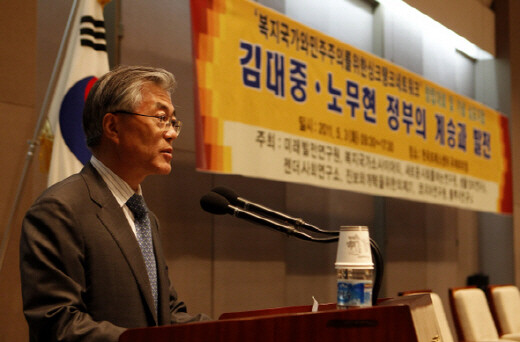hankyoreh
Links to other country sites 다른 나라 사이트 링크
[Editorial] A progressive policy consensus

Yesterday, eight progressive think tanks raised the sail on the “Think Tank Network for the Welfare State and Democracy,” a gathering to develop progressive policy alternatives. As it not only brings together major progressive think tanks like the Welfare State Society, Saesayon, Korea National Strategy Institute and Institute for Future Korea, but is also elucidating policies for the next general and presidential elections, interest and expectations are arising.
First, the launch of the network is significant in that is has clearly presented the urgent goals of progressive civic society and political forces. “More welfare, more democracy, more peace,” as presented in its founding declaration, is a task that must be realized in South Korea and the entire Korean Peninsula. Since the launch of the Lee Myung-bak administration, the market-centric and neoliberal assault has been unfolding omnidirectionally. The result is that we are witnessing the retreat of social and economic democracy, with unprecedented polarization in labor and welfare.
Many tasks to resolve have built up, such as the growing pain of underdogs like the roughly 8.5 million irregular workers, women, the middle-aged and elderly, and youth, and the insolvency of the social safety net that is supposed to support them. Also urgent is to put the breaks on the retreat of human rights and press freedom, and put the Korean Peninsula, which is in its worst crisis since South Korea’s democratization in 1987, on the right track of peaceful coexistence.
These tasks are impossible to realize through vague slogans alone: they demand concrete plans and sophisticated roadmaps. A good example is the United States’ Center for American Progress (CAP), which the network has used as a model, and its 657-page policy proposal, the “Change for America,” immediately after Barack Obama’s election in November 2008.
The launch of the network is also welcome since it elevates the possibility of next year’s two elections being policy elections. The need for a contest between policies has always been stressed in previous major elections, but this need was often pushed aside in favor of the qualities of individual candidates, ideological squabbles and regionalism. Yet just free school lunches became a core issue in the June 2 local elections last year, the importance of the vision and policies of candidates and parties is growing. The electoral alliances and coalition politics briskly discussed these days within the opposition can also move voters and have an impact only when they are combined with policy.
We hope the conservatives also clearly present their political, economic and social direction for Korean society and prepares such that there is a productive contest of policies in the election. Only by doing so can our future grow in a more dynamic and bountiful manner.
Please direct questions or comments to [englishhani@hani.co.kr]
Editorial・opinion
![[Editorial] Does Yoon think the Korean public is wrong? [Editorial] Does Yoon think the Korean public is wrong?](https://flexible.img.hani.co.kr/flexible/normal/500/300/imgdb/original/2024/0417/8517133419684774.jpg) [Editorial] Does Yoon think the Korean public is wrong?
[Editorial] Does Yoon think the Korean public is wrong?![[Editorial] As it bolsters its alliance with US, Japan must be accountable for past [Editorial] As it bolsters its alliance with US, Japan must be accountable for past](https://flexible.img.hani.co.kr/flexible/normal/500/300/imgdb/original/2024/0417/6817133413968321.jpg) [Editorial] As it bolsters its alliance with US, Japan must be accountable for past
[Editorial] As it bolsters its alliance with US, Japan must be accountable for past- [Guest essay] Amending the Constitution is Yoon’s key to leaving office in public’s good graces
- [Editorial] 10 years on, lessons of Sewol tragedy must never be forgotten
- [Column] A death blow to Korea’s prosecutor politics
- [Correspondent’s column] The US and the end of Japanese pacifism
- [Guest essay] How Korea turned its trainee doctors into monsters
- [Guest essay] As someone who helped forge Seoul-Moscow ties, their status today troubles me
- [Editorial] Koreans sent a loud and clear message to Yoon
- [Column] In Korea’s midterm elections, it’s time for accountability
Most viewed articles
- 1[Column] The clock is ticking for Korea’s first lady
- 2Samsung barricades office as unionized workers strike for better conditions
- 3S. Korea, Japan reaffirm commitment to strengthening trilateral ties with US
- 4[Editorial] When the choice is kids or career, Korea will never overcome birth rate woes
- 5[Guest essay] How Korea turned its trainee doctors into monsters
- 6Japan officially says compensation of Korean forced laborers isn’t its responsibility
- 7[Editorial] As it bolsters its alliance with US, Japan must be accountable for past
- 8Korea, Japan jointly vow response to FX volatility as currencies tumble
- 9Gangnam murderer says he killed “because women have always ignored me”
- 10Worse than worst case: Korea’s population is shrinking faster than predicted